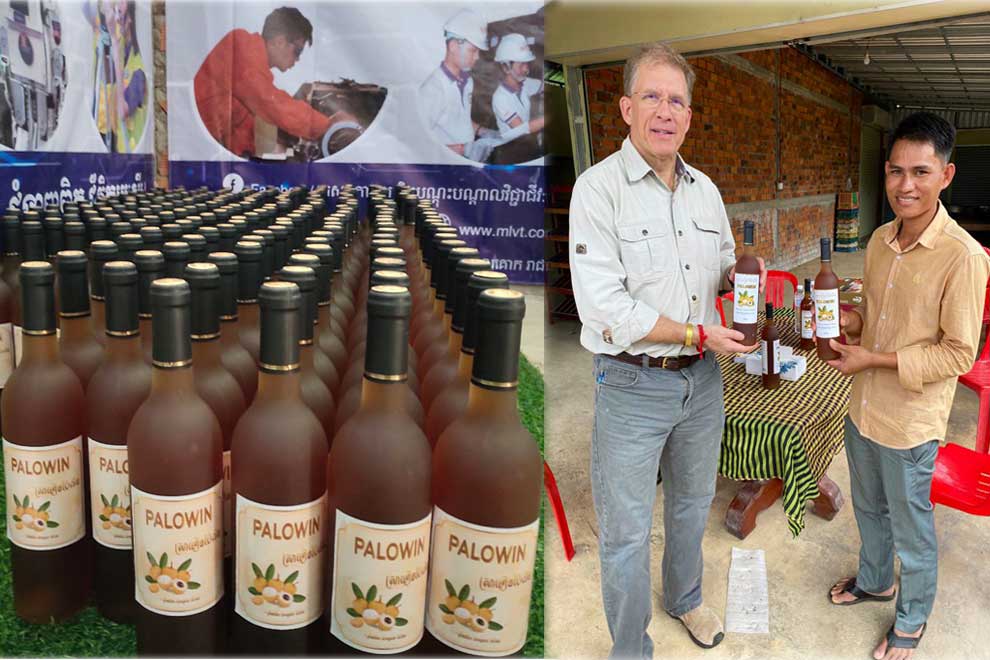
Agriculture ministry undersecretary of state Im Rachna (centre right) and several EU specialists examine the drinks made by students at the University of Kratie earlier this month. Hong Menea
In the heart of their journey at the University of Kratie, Duong Mony and seven fellow students, yet to complete their bachelor’s degrees, are harnessing their skills for processing various local products. From cashew nuts to lemongrass, rosella flowers, aloe vera and lemon tea, they craft five distinct beverages.
Mony’s team envisions growth with capital assistance, aiming to reduce reliance on imported drinks.
For 20-year-old Mony, whose roots lie in Thmor Kre commune’s Thmor Kre Leu village in Kratie province’s Chet Borey district, this venture into beverage processing was unexpected.
Currently in his fourth year studying crop protection and harvesting technology at the University of Kratie, Mony’s journey began in a rural elementary school where becoming a beverage processor was beyond imagination.
Representing the group, he shares that their journey commenced with a proposal to their principal lecturer. They sought approval to translate their desire into action and demonstrate that results could stem from practical applications. With the lecturer’s endorsement, the group of eight students initiated their research, utilising university facilities designated for student practice.
Artisanal concoctions
Highlighting the production process, Mony reveals that their group crafts five beverages from local agricultural products. The method involves common steps such as boiling, cooking and mixing. For instance, in creating rosella flower drinks with their distinct sour taste, the flowers undergo drying, followed by boiling in water to achieve a pleasant taste and colour. The addition of sugar, capped with a one to two-hour boil, yields a refreshing beverage.
He mentions that their soft drinks don’t quite meet global standards as the group hasn’t delved into the intricate details of the drinks’ nutrients. However, their beverages are consumable without health concerns. The processing ensures the balance of ingredients, maintaining a sugar content of eight to 10 per cent in each drink.
Mony notes that individuals with diabetes may wish to limit their consumption.
“My team started crafting these drinks with the aim of boosting the market value of local raw materials. I believe that can happen if these drinks become a viable product,” he remarks.
He notes that while their beverage processing is a mere production sample, the five types of drinks they’ve created are delicious. With additional financial backing, they could establish an enterprise, creating job opportunities. Currently, their soft drinks are only available on the university campus and at PTT filling station in the namesake provincial town.
Flavourful inclinations
Mony mentions that today’s youth, along with some older individuals, prefer canned beverages with high preservative levels, showing a preference against organic drinks.
He notes that four of the five drinks they process can last around half a month when stored at 5 degree Celsius, but the cashew-based drinks are more perishable due to their nutritional content.
In the realm of beverage processing, Horn Metta, the principal lecturer and adviser for Mony’s group, tells The Post that he commends the students for their initiative.
He notes their high level of activity and quick comprehension. If they aim to create something, he says that they efficiently develop a project, submitting it for review before getting started. Additionally, these beverages are being prepared at the university as part of the One Village One Product (OVOP) Movement in Kratie province, where guests have the opportunity to enjoy them.
“These drinks haven’t reached the same scale or standards as other products since we process them without preservatives. The university intends to eventually launch production and sales, but it’s not feasible right now,” he explains.
Skill cultivation
Khuon Vicheka, a spokesperson for the Ministry of Education, Youth and Sport, tells The Post that the ministry has initiated a Higher Education Improvement Project, aiming to foster collaboration between high schools and universities, promoting research and processing of food. The emphasis is on utilising district and provincial resources to create products, extending beyond agriculture to various sectors.
“The ministry benefits from government budget support to facilitate operations and promote research. We encourage students to dive into researching, testing and processing not only food products but also engaging in electronic and digital-related tasks,” she says.
Vicheka highlights that at the University of Kratie, programmes centred on agricultural and community development incorporate subjects focusing on food processing. The emphasis is on utilising available resources to develop consumables, materials and food.
To foster and support student research, the university has undertaken significant efforts to collaborate with surrounding communities, enabling students to engage in research, training and assisting those in the province with food processing.
The university also hosts various events, providing students with opportunities to showcase their work and engage with organisational partners like the UN Food and Agriculture Organisation (FAO). This collaboration extends to research and internships.
Vicheka notes that the university collaborates closely with private enterprises and local stakeholders to create job opportunities. As a result, graduates and current students alike find employment aligned with their sought-after skills.

.jpg)




























